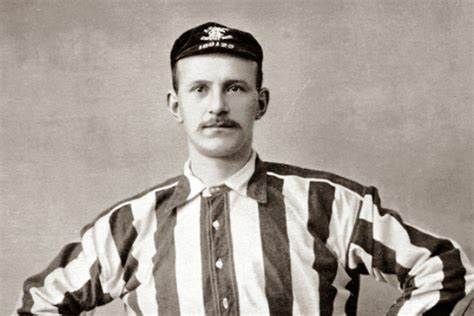John Edward Doig (1866-1919) was a Scottish goalkeeper, nicknamed the “Prince of Goalkeepers”, who kept goal for the "Team of all the Talents" that represented Sunderland in the 1890s. He was an instantly recognizable figure, his bald head covered by a cap kept in place by an elastic strap fastened under his chin. “Teddy” as he was popularly known in the North West, starting playing football at the age of sixteen and originally played as a right winger for his first club St Helena, Arbroath, making two appearances for Scotland in this position. He first moved to Blackburn Rovers but only made one appearance before joining Sunderland in 1890. By this time, he had switched to keeping goal which he did with great distinction. Powerfully built, he could punch the ball as far as an average player could kick. Doig went on to be an ever-present in goal for the Wearsiders in the 14 seasons he spent at the club, winning four league championships in the process and making 457 appearances in major competitions.The Football News, 14 January 1899, declared ‘at his best [Doig] was incomparable. He was marvellously clever in throwing the ball away to the best advantage. His throw, indeed, was as good as, if not better than, an ordinary pass’. In a memorable account of a derby game against Newcastle at an overcast St James’ Park in September 1896, Doig was man of the match securing a 2-2 draw against their bitter rivals. According to the Newcastle Daily Chronicle, 3 September 1896, ‘The game was a grand one almost throughout, and there cannot be the slightest doubt that the home team were only robbed of victory by the tireless vigilance, agility, and dexterity of the Sunderland goalkeeper. For there were several conjunctions in the second half during the whole of which United had consistently the better of the game, when the Sunderland goal seemed bound to succumb, and would undoubtedly have succumbed but for the sterling qualities of the player named’. Doig signed for recently relegated Liverpool for a fee of £150 in 1904. In his first season with the Merseysiders, he helped the club achieve immediate promotion back to the top division. However, the next season saw his place lost to future England star Sam Hardy. He played his last game in April 1908, at the age of 41 years and 165 days, which is still a Liverpool record.He finished his career with the amateur club St. Helens Recreationals in the Lancashire league, finally retiring in 1910. He died in 1919 , one of the victrims of the Spanish Flu epidemic. In paying tribute to him the Sunday Sun, 9 November 1919, declared that ‘he was acknowledged to have been one of the best custodians ever seen between the sticks’.
John Edward Doig

